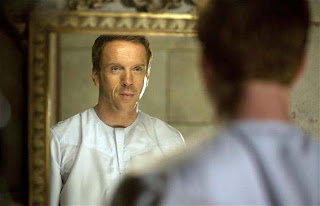 |
| She really does give a great performance. |
Imagine that you can see every moment of another person’s
life. Imagine that you have to. It’s important, life and death, that you keep
watching.
What on earth do you do when they start getting freaky?
This is the question not exactly raised by Homeland (and a lot of other movies and
TV shows too, but we’ll get there in a minute). I’m reasonably sure that the
intended questions raised are about security versus personal privacy, do the
ends justify the means, etc. That’s probably what the show’s going after. But
I’m a terrible person, and this is what I got from it.
Do you keep looking when they go full frontal?
As a refresher on the show, Homeland is a thriller on Showtime, focused around Claire Danes as
an obsessive and intense CIA agent who suspects Damien Lewis of being an Al
Qaeda operative. Lewis plays Sgt. Brody, an American POW who spent eight years
in various prisons being tortured and has just now come home. It’s a delicately
balanced play on reality versus delusion, with a heaping side dish of paranoia.
It’s great. Really well done.
So, would you?
Danes’ character, Carrie, is absolutely positive, given some
intelligence she gathered from a source in Iraq, that Brody has been turned by Abu
Nazir himself, a high ranking Al Qaeda official. She is sure that Brody’s
return to the states is a sign that a new attack is coming soon. And, to be
honest, we don’t know if she’s right or wrong. There are a lot of things about
Brody that certainly suggest she could be onto him. He lies. He’s a little
creepy. He does strange things, and he definitely experienced some Stockholm
Syndrome while in captivity.
But Brody also deeply missed his wife and kids. He could
just be a good soldier dealing with some massive PTSD problems now that he’s
home. The important part is that we don’t know exactly what’s going on.
Carrie, though, Carrie thinks she does know, so without
agency support or knowledge, she wiretaps and bugs Brody’s whole house. She
alienates her staunchest supporter at the agency, Mandy Patinkin in his usual
mentor role, and devotes herself wholeheartedly to watching every second of
Brody’s life now. Including the naughty bits.
That’s where we come in with our ethical question. What
Carrie’s doing is patently illegal (even though she does later get a warrant
for it, it’s after the fact), and her obsessive interest in Brody’s life is
sometimes hard to watch. She believes that any moment there could be decisive
proof that Brody is a terrorist. Which means that she watches every moment.
Brody’s wife, played delicately by Morena Baccarin
(seriously, she’s doing a pretty Emmy-worthy job), is unsure of how to fit her
long-lost husband back into her life. The easiest answer is to just have sex
and figure it out in the morning, but that’s not actually simple to pull off.
Things have changed. People have changed. And she’s been a single mom for a
long time. So there are a lot of intimate bedroom scenes for us (and Carrie) to
stare at. Dissecting their relationship and calculating the odds that he’s a
stranger now.
Really, though it seems to be trying to talk more about
privacy issues, the show comes off as a wide-spread discussion on voyeurism. We
audience spend most of our time watching Brody with Carrie, or watching Carrie
go about her day. It’s very rare that we get a glimpse of Brody when Carrie
can’t see him, and when it happens, it feels jarring. Strange. Like we
shouldn’t be looking.
That’s a bit weird, right?
In a show that’s all about secrets and what people do when
no one is looking, it’s strange that we feel so weird watching someone when no
one else is looking. Except us. We as the audience are constant voyeurs, even
when Carrie can’t see it. We see. We judge. We’re exactly the same as she is.
Now, I’m not sure if the show is meant to be some kind of
meta-narrative about privacy in an internet age, or how your every action can
now be scrutinized by the media or by millions of people online. I do know that
the show is supposed to be a meta-narrative about surveillance in a terrorist
age, but that seems beside the point. Too obvious. And a little heavy handed.
The character of Carrie lends a strange weight to the whole
thing too. She’s not simple or easy to define by any standards, which is good
on such a nuanced show, but does make having an opinion about her hard. Carrie
is obsessive about surveillance, but wants her own privacy to be sacred. She’s
devoted to her job, but probably too devoted. She’s mentally unstable, but
feels a need to judge mental instability in others. She uses sex as a weapon to
make people underestimate her, and she’s horribly bad at being subtle. In
short, she’s complicated.
I don’t really like her, personally, but I don’t feel like I
have to, either. I don’t have to love Carrie to care about where her story
goes, just like I don’t have to necessarily agree with her to be fascinated by
her obsession. She’s a well-written character, and that makes her story
interesting.
But do I think she’s messed up in the head? Oh, totally.
Is Carrie a strong female character? Kind of. Yes, she’s
horribly insane and really prone to ridiculous moments of hoarse screaming and
hysteria. But. She’s an agent of her own fate. She knows that she needs help,
and if she doesn’t get it, that’s because she doesn’t want to get it, not
because she can’t. She knows exactly who she is, and plugs on regardless. And
she knows that it could be all in her head, but the alternative is worse.
Carrie is active in her own life. She is a player. That makes her pretty strong
to me.
But we still haven’t answered the big important question. If
you had to spy on someone day and night to make sure that they didn’t do
something potentially awful, would you? Even when they’re getting busy or in
the shower or sleeping?
Well?
 |
| Seriously, though. Great show. |




No comments:
Post a Comment